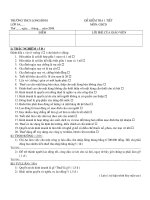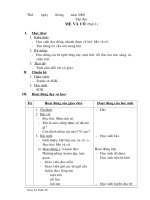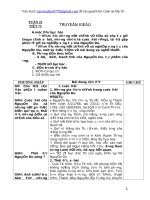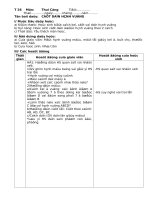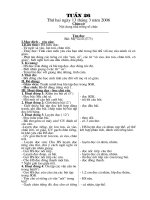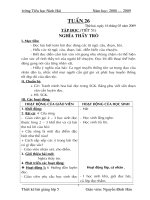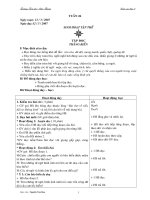Giao an tu tuan 26
Bạn đang xem bản rút gọn của tài liệu. Xem và tải ngay bản đầy đủ của tài liệu tại đây (110 KB, 11 trang )
Nguyễn Phan Tuệ
Week 25
Date of pre:27 Fe 2010
Date of te Fe 2010
Period: 72 UNIT 12: -WHAT ARE THEY
DONG?
I. Aims: -By the end of the lesson Sts can describe sporting activities
and pastimes- talk about them.
II. Functions of languages: + Structures: - The present simple: - I play
soccer. – What sports do you play?
- The present continuous: - He/she is
jogging. – What is he/she doing?
+Vocabulary: - (n.) badminton , soccer,
volleyball, skipping, aerobics, tennis, table tennis … .
- (v.) swim, play, jog .
III. Behavior: - Do physical exercises or play sports to stay healthy.*
(proverb): “A sound mind in a sound body”.
IV. Teaching aids: - pictures of people playing sports.
V. Procedures:
Teacher and Sts’ activities : Contents :
Ψ Previous lesson: - correcting STS’
Common mistakes of the one-period test
-
Ψ Today’s lesson :
_ Represent the situation through the
pictures of people playing sports. Remind
STS of the formation and the use of the
present progressive.
_ Have STS supply the Vnamese
meaning by answer the Q. “What is
he/she // are they doing? from the teacher.
_ Have Sts listen the tape and read the
sentence under each pic. silently.
+ Practice in Pair: asking and
answering
+ Some pairs of Sts practice in front of
the class.
* Results:
A1. a) Listen and repeat. Then practice with a
partner.
Vocabulary.
- Swim (v.) → swimming: bơi lội – badminton (n):
môn cầu lông
- soccer(n):môn bóng đá (football) – volleyball (n):
môn bóng chuyền _ skip (v.) → skipping: nhảy dây
_ aerobics [‘e
ərΩ
biks] : môn thể dục nhòp điệu. _
tennis (n.): môn quần vợt. _ table tennis (n.) môn
bóng bàn. – jog (v.) → jogging : đi bô thể dục
A2 . Ask and answer.
Example:
a) St1: What is he doing? St2: He’s
Class Quite
good
(8– 10pts)
Good
(6. 5-7. 5)
Ave.
(5 –
6)
Weak
(3- 4. 5)
Too weak
(under 3)
6A……
Nguyễn Phan Tuệ
_ Have STS repeat the words used to
practice if necessary.
_ Play the tape for Sts to listen and
repeat.
+ Pair Work or group work of four Sts:
Choose one of sentences to practice
asking andanswering.
+ Some pairs of Sts practice in front of
the class.
_ Correct whatever’s wrong.
_ Introduce the boy and the girl with
sports they like and play.
+ Read the text silently. Then practice
asking and answering the questions in
pairs.
_ Check Sts’ answers up and correct
whatever’s wrong.
_ Give the instructions to do the practice:
+ Sts ask their classmates (as many as
possiple) the question “What sports do
you play?” and write the answers down.
_ Have some STS read the the answers
written.
_ Give comments and correct whatever’s
wrong
Consolidation:
* To ask and answer SB which sports he /
she plays. (?)
* Use the present progressive to ask and
answer
* The formation of verb in present
progressive (?)
swimming.
b) St1 What are they doing? St2: They’re
playing badminton.
……………………………………………………
d) St1: What is she doing? St2: She’s
skpping.
………………………………………………………
A3. Listen and repeat. Which sports do you play?
Example:
St1: -Which sports do you play?
St2: -I play soccer.(a)
St1: -Which sports do you play?
St3: - I skip. (c)
A4. Read and answer. Then answer the
questions.
Answers:
She (Lan) plays badminton. / She swims, she does
aerobics.
No,. She doesn’t play tennis.
He plays soccer; he jgs.
Yes. He plays table tennis.
.
A5. Write.
Answers can be:
Lan skips
Hoa plays tennis.
Hung jogs
Nam plays soccer.
Xuaân does aerobics
A6. Remember.
* - Which sports do you play? – I play soccer.
- Which sports does she play? – She plays
badminton.
* - What are you doing now? _ I’m playing
soccer.
Nguyễn Phan Tuệ
* Ask SB which sports he / she plays.
He/she answers (?)
- What is she doing now? _ She’s playing
badminton.
Remember:
* do → be doing. -play → be playing - swim
→be swimming
* which sports do you play?
I play table tennis. / I do aerobics./ I skip
C. Homework: - Practice speaking and writing what’s been learned. – Workbook A1, 2 & 3
(p.p. 103, 104)
……………………………………………………………………………
Week 26
Date of pre:2 March 2010
Date of te: March 2010
Period: 73
UNIT 12: -WHAT ARE THEY DONG? –B.
1, 2, &3.
I. Aims: By the end of the lesson Sts can describe timetables during
pastimes- talk about frequency.
II. Functions of languages: + Structures: - The present simple: – What
do you/does he do in your / his free time?
+Vocabulary: - (n.) badminton , soccer,
volleyball, skipping, aerobics, tennis, table tennis … .
- (v.) swim, play, jog .
III. Behavior: - Spend free time properly and usefully.
IV. Teaching aids: - pictures of people spending pastimes – timetables of
free time.
Procedures:
Teacher and Sts’ activities : Contents :
Ψ Previous lesson: - St1 :
(speaking&writ.)
(book closed)
Ψ Today’s lesson:
• A 5: St1: asks some of classmates and recites
he/she which sports he/she plays?
B1. Listen and read.
What do you do in the free time?
Nguyễn Phan Tuệ
_ Guide Sts to revise the words and
phrases of activities in the free time by
asking Qs in Vietnamese for Sts to
answer. + Look at
the pictures listening and repeating the
activities in the free time.
• Process: examples (T. _ St )
• Sts _Sts : Practice in pairs.
+ Some pairs of Sts practice in front of
the class.
_ Correct whatever’s wrong.
_ Represent the contents of the
sentences:
* Notice the 3
rd
personal subjects:
Phương, Ly, Nam, Lan and Tuan + v-s /
es
+ Listen and repeat silently after the
tape._section B1. Sents a) – f)
+ Practice in pairs: ask and answer
questions about the pictures in exercise
B1
*Consolidation:
- Asking and answering about activities
in SB’s free time with the present
simple
• vocabulary:
- go to the movies: đi xem chieu phim.
- watch TV : xem truyền hình
- read : đọc sách báo
- listen to music : nghe nhạc.
- go fishing : đi câu cá.
- play video games: chơi trò chơi điện tử.
B2. Practice with a partner.
*Examples:
T: - What do you do in your free time ? St1: - I read
T: - What do you do in your free time? St2: - I play
video games
* go on in pairs.
B3. Listen and read.
a) Phương goes to the movies.
b) Ly watches TV.
c) Nam reads
d) Lan listens to the radio.
e) Tuan goes fishing.
f) Long plays video games.
• Example:
St1: -What does Phương do in his free time ?
St2: -He goes to the movies.
• Remember:
- What do you do in your free time?- I watch TV
- What does Phương / he /she do in his / her free time
?
- He / she reads / listens to the music
C. Homework: - Practice speaking and writing what’s been learned. – Workbook B1,2 & 3(pp. 104,
105)
…………………………………………………………………………………
Week 26
Date of pre:2 March 2010
Date of te: March 2010
Nguyễn Phan Tuệ
Period: 74
UNIT 12: -WHAT ARE THEY DONG?
B. 4, 5, & 6.
I. Aims: -By the end of the lesson Sts can talk about frequency.
II. Functions of languages: + Structures: - How often do you / does
he/she play sports?
- I play / he/she plays sports
once / twice a week
+Vocabulary: - Revision: go to the movies,
watch TV, read, listen to the music, …. .
III. Behavior: - Spend free time properly and usefully.
IV. Teaching aids: - pictures of people spending pastimes – timetables of
free time.
V. Procedures:
Teacher and Sts’ activities : Contents :
Ψ Previous lesson: - St1+ St2 ( asking &
ans.)
(book closed) - St2 + St3 :( asking &
ans.)
Ψ Today’s lesson:
_ Guide Sts do the exercise: – Write the
names of the people with activities they
do in their free time.
_ Ask Sts the meaning of each picture.
+ Listen the tape and do the exercise as
directed.
+ Check answers together
+ Some Sts give the answers.
_ Play the tape one for Sts to listen and
check by themselves.
_ Build the situation to represent adverbs
of degree for activities: once, twice three
times.
_ Use Ly’s timetable to explain these
adverbs and represent the question for
these adverbs.
• B3: (teacher suggests people’s pastimes activities
in EX. B1 )
St1: - What does Phöông do in his / her free time ?
St2: - He goes to the movies.
B4 .Listen. Match the names…
• Key:
- Taân f) -Minh andNam e) Lieân a) Lan and
Mai b)
• Tape transcript
- Taân reads.
- Minh andNam play video games.
- Lieân wayches TV.
- Lan and Mai listen to music
B5. Listen and read. How often?
• vocabulary:
- How often….? = How many times…?
- Once = one time.
- Twice = two times
• Examples:
T. -How often does Ly go jogging?
Nguyễn Phan Tuệ
+ Listen to the tape of the dia. and repeat
after it.
_ Show Ly’s diary and ask STS some Qs
about frequency as example
+ Practice in pairs: asking and
answering about Ly’s activities based the
example and her diary.
+ Some pairs of Sts practice in front of
the class.
_ If possible, have each St make his /
her own timetable so that they practice
asking and answering about activities use
“how often”
• Consolidation
* asking and answering about degree.
Sts: - She goes jogging once a week.
St1: -How often does Ly listen to the music?
St2: - She listens to the music twice a week.
St1: - How often does Ly go fishing?
St2: - She goes fishing once a week.
……………………………………………………………………………….
B6. Remember:
How often … ?
- once a week; twice a week; three / four / five …
times a week.
C. Homework: - Practice speaking and writing what’s been learned. – Workbook B3, 4 & 5 (p.105,
106)
………………………………………………………………………………………………
Week 26
Date of pre:2 March 2010
Date of te: March 2010
Period: 75
UNIT 12: -WHAT ARE THEY
DONG?
C. 1, 2, 3 ,4
I. Aims: By the end of the lesson Sts can talk about frequency- use
adverbs of frequency.
II. Functions of languages: + Structures: - How often do you / does
he/she go fishing?
- I always go fishing - He /
She never goes fishing
+Vocabulary: - Adverbs of frequency:
always, usually, often, sometimes, never.
III. Behavior: - Spend time properly and usefully Always be on time.
IV. Teaching aids: - pictures of people with activities .
.V. Procedures:
Teacher and Sts’ activities : Contents :
Nguyễn Phan Tuệ
Ψ Previous lesson:
St1 + St2 : asking & answering. (book
open)
Ψ Today’s lesson:
_ Play the tape for Sts to listen and repeat
the Adverbs of frequency in chorus.
_ Make clear their meaning by showing
the percentage (%) or give the
Vietnamese meaning.
_Represent the contents of the text: about
Ba and Lan’s activities. Notice the
adverbs of frequency supplying new
words and phrases.
+ Listen and repeat after the tape.
+ Read the text silently.
+ Practice in pairs: using the Qs
provided as example to ask & answer
about Ba and Lan’s activities
+ Some pairs of Sts practice in front of
the class.
_ Correct whatever’s wrong
- use always, usually, often, sometimes,
never
_ Ask Sts some Qs as example.
+ Practice in pairs: ask & answer the
questions of section A4.
+ Build more questions beside the Qs
given.
+ Write answers to the questions
• Consolidation:
* Talking about frequency with the
• B5: (Ly’s diary) : St1: - How often does Ly go
jogging?
St2: - She goes jogging once a
week.
C1 . Listen and repeat.
• Vocabulary:
- always
→
usually
→
often
→
sometimes
→
never
(100%) → (80%) → (60%) → (20%) → (0
% (luôn luôn – rấy thường – thường – thỉnh
thoảng – không bao giờ)
C2 . Listen and repeat.
• Vocabulary:
- about: khoảng / độ
- have a picnic : đi chơi dã ngoại.
- fly kite(s) : thả diều
- go camping : đi cắm trại
- a tent : lều / trại
- because (conj.) bởi vì
C3. Ask and answer.
• Examples:
St1: -How often do Ba and Lan go to the zoo?
St2: - They sometimes go to the zoo
St1: - How often do Ba and Lan go to the park??
St2: - They go about twice a week.
Ba and Lan / they sometimes go to the zoo.
- How often do they go camping?
- They never go camping
-
C4. Write sentences about you.
• Answers can be:
a) I go to the zoo once month.
b) I often go to the park on Sunday afternoons.
c) I always play sports in the afternoon.
d) I never go camping ( because I am still young)
e) I sometimes go fishing .
f) I always help my mom every day.
g) I am never late for school.
Nguyễn Phan Tuệ
present simple.
* Asking and answering about frequency
C. Homework: - Practice speaking and writing what’s been learned. – Workbook C 1, 2. (pp. 106,
107)
……………………………………………………………………………………………
Week 27
Date of pre:March 2010
Date of te: March 2010
Period: 76
UNIT 12: -WHAT ARE THEY DONG? –
C. 5, 6 &7
I. Aims: By the end of the lesson Sts can talk about frequency- use
adverbs of frequency.
II. Functions of languages: + Structures: - How often do you / does
he/she go fishing?
- I always go fishing - He /
She never goes fishing
+Vocabulary: - Adverbs of frequency:
always, usually, often, sometimes, never.
III. Behavior: - Spend time properly and usefully Always be on time.
IV. Teaching aids: - pictures of people with activities .
V. Procedures:
Teacher and Sts’ activities : Contents :
Ψ Previous lesson:
- St1: reading (book open)
- St2 + St3: asking & ans. (book open)
Ψ Today’s lesson:
_ Guide Sts the way to do the listening
exercise and represent the contents the
tape transcript.
+ Listen and match the adverbs of
frequency with the pictures appropriately.
_ Ask some Sts give the answers.
• B2: the text about Ba and Lan’s activities
• St1: - How often do Ba and Land go to the park?
St2: - They go about twice a week.
C5 . Listen. How often do Nga and Lan do these
things
• key:
a) never b) sometimes c) often d) often e)
usually
• tape transcript.
- Nga and Lan never go camping
- They sometimes go to the zo.
- They often go to the park.
Nguyễn Phan Tuệ
+ Listen the tape to check.
_ Give the class the key
_ Represent the contents : about Minh
and his friends’ pastimes
+ Read the text silently, then answer the
questions
+ Some pairs of Sts practice in front of
the class.
_ Correct whatever’s wrong
• Consolidate:
*Talking about frequency with the
present simple.
*Adverbs of frequency
- They often play sports.
- They usually have a picnic in the park.
C6 . Read. Then answer.
• New words and phrases.
- in the mountains: ở vùng núi
- wear (v.): mặc (quần, áo) / mang (giày dép)
- boots: giày ủng. –Over night : qua đêm.
- A camping stove: bếp dùng đi cắm trại.
• Answers:
a) He likes walking. c) He goes on the weekend.
b) They always wear strong boots and warm clothes.
d) He usually goes with two friends.
e) He often goes walking in the mountains.
f) They always take food, water and a camping
stove.
C7 . Remember
Ba and Lan / They sometimes have a picnic. / He
often goes
Always, usually, often, sometimes, never …
C. Homework: - Practice speaking and writing what’s been learned. – Workbook C 3&4 (p. 107)
Nguyễn Phan Tuệ
Nguyễn Phan Tuệ
ggggg
